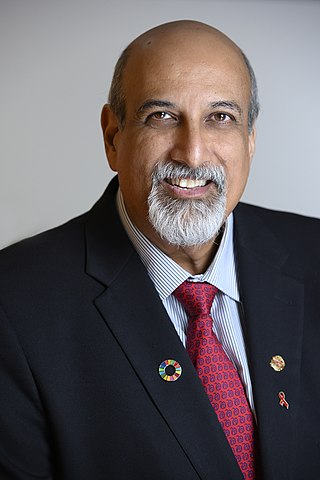
The United States President's Emergency Plan For AIDS Relief (PEPFAR) is a United States governmental initiative to address the global HIV/AIDS epidemic and help save the lives of those suffering from the disease. Launched by U.S. President George W. Bush in 2003, as of May 2020, PEPFAR has provided about $90 billion in cumulative funding for HIV/AIDS treatment, prevention, and research since its inception, making it the largest global health program focused on a single disease in history until the COVID-19 pandemic. PEPFAR is implemented by a combination of U.S. government agencies in over 50 countries and overseen by the Global AIDS Coordinator at the U.S. Department of State. As of 2021, PEPFAR has saved over 20 million lives, primarily in Sub-Saharan Africa.

Mpule Keneilwe Kwelagobe is a Motswana investor, businesswoman, model, and beauty queen who was crowned Miss Universe 1999. She was the first black African woman to win one of the Big Four international beauty pageants, the first woman from Botswana to win, and the first from a nation making their debut in nearly four decades. Kwelagobe had previously been crowned Miss Botswana 1997 and Miss Universe Botswana 1999, and competed in Miss World 1997.
Professor Sheila Dinotshe Tlou is a Botswana nurse, specialist in HIV/AIDS and women's health, and a nursing educator. She was Minister of Health from 2004 to 2008. Professor Tlou is a distinguished advocate for human resources for health issues. She is a recognized visionary leader and champion.

Perry N. Halkitis is an American of Greek ancestry public health psychologist and applied statistician known for his research on the health of LGBT populations with an emphasis on HIV/AIDS, substance use, and mental health. Perry is Dean and Professor of Biostatistics, Health Education, and Behavioral Science at the Rutgers School of Public Health.

Geeta Rao Gupta is a leader on gender, women's issues, and HIV/AIDS who has been serving as executive director of the 3D Program for Girls and Women and senior fellow at the United Nations Foundation since 2017. She is frequently consulted on issues related to AIDS prevention and women's vulnerability to HIV and is an advocate for women's economic and social empowerment to fight disease, poverty and hunger.

Agnes Binagwaho is a Rwandan pediatrician and co-founder and the former vice chancellor of the University of Global Health Equity (2017-2022). In 1996, she returned to Rwanda where she provided clinical care in the public sector as well as held many positions including the position of Permanent Secretary for the Ministry of Health of Rwanda from October 2008 until May 2011 and Minister of Health from May 2011 until July 2016. She has been a Professor of Global Health Delivery Practice since 2016 and a Professor of Pediatrics since 2017 at the University of Global Health Equity. She resides in Kigali.

Mary Jane Rotheram-Borus is a licensed clinical psychologist and professor with the University of California, Los Angeles, Department of Psychiatry and Biobehavioral Sciences. Rotheram is the professor-in-residence in the Semel Institute for Neuroscience and Human Behavior. She is the Director of the Global Center for Children and Families at UCLA and the former director of the Center for HIV Identification, Prevention, and Treatment Services.

Quarraisha Abdool Karim is an infectious diseases epidemiologist and co-founder and Associate Scientific Director of CAPRISA. She is a Professor in Clinical Epidemiology, Columbia University, New York and Pro-Vice Chancellor for African Health, University of KwaZulu-Natal, South Africa.

Salim S. Abdool Karim, MBChB, MMed, MS(Epi), FFPHM, FFPath (Virol), DipData, PhD, DSc(hc) is a South African public health physician, epidemiologist and virologist who has played a leading role in the AIDS and COVID-19 pandemic. His scientific contributions have impacted the landscape of HIV prevention and treatment, saving thousands of lives

Janet L. Mitchell was an American physician known for her advances in perinatal HIV/AIDS treatment. During the early days of the AIDS epidemic in the U.S. Mitchell developed protocols for health treatment of pregnant women who were HIV positive or at risk for developing AIDS. She advocated against mandatory testing and testifying before Congress, she advocated in favor of an inclusive approach to health care and social services. One of her innovations derived from a study that saw a 70% decrease in HIV transmission to babies when AZT was administered to their mothers during the pregnancy.

Lordina Mahama is a Ghanaian former First Lady of Ghana who served as first lady from 2012 to 2017. She is married to the fourth President of the Fourth Republic of Ghana, John Dramani Mahama. Prior to becoming First Lady, she was the Second Lady of Ghana from 2009 to 2012.
Jeffrey T. Parsons is an American psychologist, researcher, and educator; he was a Distinguished Professor of Psychology at Hunter College and The Graduate Center of the City University of New York (CUNY) and was the Director of Hunter College's Center for HIV/AIDS Educational Studies & Training, which he founded in 1996. Parsons was trained as a developmental psychologist and applied this training to understand health, with a particular emphasis on HIV prevention and treatment. He was known for his research on HIV risk behaviors of gay, bisexual, and other men who have sex with men (GBMSM), HIV-related syndemics, and sexual compulsivity. He resigned his positions at CUNY on July 3, 2019, following a year-long university investigation of misconduct allegations against him.
Cynthia Ann Gómez is an American psychologist who works in public health. She is known for her work in the field of HIV/AIDS prevention, health care access and health equity for minority individuals and committees. Likewise, one of her most major accomplishments was being the founding director of the Health Equity Institute at San Francisco State University. She has been a teacher and researcher, as well as a leader in both teaching and governmental positions.

Lisa Bowleg is an applied social psychologist known for conducting research on intersectionality in social and behavioral science and the relationship between social-contextual factors and stress, resilience, and HIV risk in Black communities.
Faye Z. Belgrave is a psychologist known for her research conducted for the benefit of the African American youth, specifically in the areas of substance abuse and HIV. She is currently a professor of Psychology and the founding director of the Center for Cultural Experiences in Prevention (CCEP) at Virginia Commonwealth University (VCU).

Chanita Ann Hughes-Halbert is an American psychologist and medical researcher. She is professor of psychiatry and behavioral sciences at the Medical University of South Carolina and the AT&T Distinguished Endowed Chair for Cancer Equity at the Hollings Cancer Center. She is the first woman and first African American from South Carolina elected to the National Academy of Medicine.
Sten H. Vermund is the Anna M.R. Lauder Professor of Public Health, and former Dean (2017-2022) of the Yale School of Public Health, and also serves as a Professor in Pediatrics at the Yale School of Medicine. He is a pediatrician and infectious disease epidemiologist focused on diseases of low and middle-income countries.
Pamela Y. Collins is an American psychiatrist. She is the Director of the International Training and Education Center for Health (I-TECH) and the Global Mental Health Program at the University of Washington School of Medicine and School of Public Health. Collins is professor of psychiatry and behavioral sciences and of global health. She previously worked as the director of the Office for Research on Disparities and Global Mental Health at the National Institute of Mental Health (NIMH).
Scyatta A. Wallace is a developmental psychologist who studies how gender, race, and culture impact health outcomes of urban Black youth. In her community-based research and practice, Wallace emphasizes the importance of cultural competence and the need to diversify the workforce in health and mental health professions to better serve ethnic-minority communities. Wallace is an associate professor of psychology with tenure at St. John's University.
Susanna W. Grannis is a retired American academic, and the founder of CHABHA, a nonprofit organization that supported orphans and vulnerable children in Rwanda, Burundi, and South Africa from 2004 to 2014. She was professor and dean at the University of Illinois Chicago, Queens College, and at the Bank Street College of Education. She is the author of Hope Amidst Despair: HIV/AIDS-Affected Children in Sub-Saharan Africa and two self-published children's books. Writing as Susanna W. Pflaum, she is the author of books and academic papers about teaching and education, with a particular focus on advancing academic opportunity for disadvantaged students. She lives in Stuyvesant Falls, New York.











